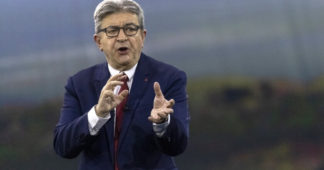The left-wing winners of France’s election accused “President of the Rich” Macron of a “coup”. To keep the left from power, he allied with the far right, appointing a PM from the party in 4th place.
By Ben Norton
Sep 10, 2024
France’s leader Emmanuel Macron, a multimillionaire investment banker known popularly as the “president of the rich”, has been accused by the country’s left-wing opposition of stealing the election and carrying out a “coup”.
In June and July, France held two rounds of voting. Macron lost the election, while a coalition of leftist parties came in first place. But Macron refused to allow them to form a government.
Instead, Macron made a tacit alliance with the French far right to keep the left out of power, and he appointed as prime minister a conservative politician from an unpopular party that came in fourth place and earned just around 6% of the vote.
Macron: the president of the rich
Macron has been a loyal ally of France’s billionaire oligarchs. Immediately after coming to office in 2017, he ended the country’s wealth tax.
Three years later, Forbes summarized the outcome: “France’s Rich Get Much Richer After Abolition Of Wealth Tax”.
One of Macron’s most powerful sponsors is the magnate Bernard Arnault, who in 2024 overtook Elon Musk to become the richest man on Earth, with an estimated $233 billion in wealth.
Arnault is chairman and CEO of the luxury goods company LVMH, owner of brands like Louis Vuitton, Moët Hennessy, Dior, Tiffany, and Marc Jacobs, which have thrived in recent years as wealthy clients have gotten even richer.
Arnault has supported Macron since the very beginning of his presidency, praising the former investment banker for “sharing his vision”. The billionaire has exercised significant influence over Macron, going so far as to help him decide who should become prime minister.
Macron has returned the favor. In March 2024, he held a lavish ceremony in the Élysée Palace, in which he awarded Arnault with France’s highest honor. The gala was also attended by Elon Musk, who had a one-on-one meeting with Macron, Politico reported.
Inequality has exploded under Macron.
In 1996, the 500 richest families in France held wealth equal to 6% of the country’s GDP. When Macron came to power, that figure had increased to 20%. It soon skyrocketed.
Thanks to Macron’s abolition of the wealth tax, the 500 richest families owned assets equal to a staggering 45% of France’s GDP in 2022 – nearly half the value of all the goods and services produced in the country in one year.
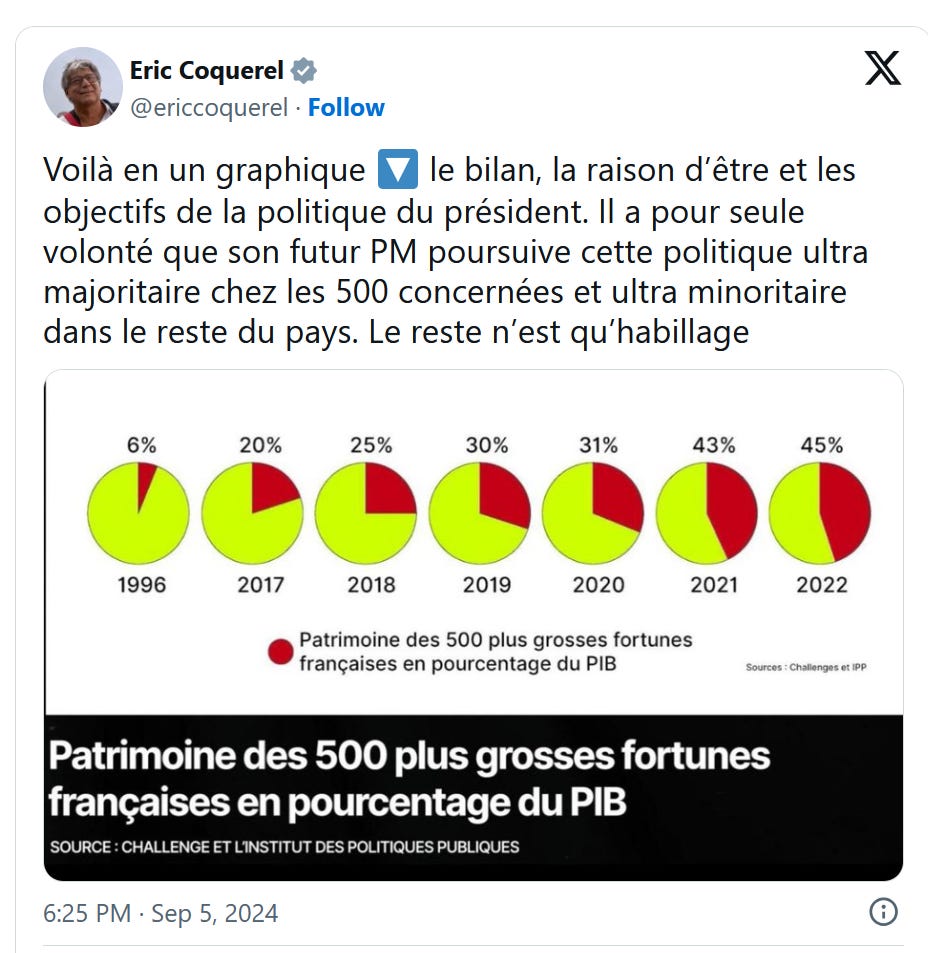
While reducing taxes on the rich, Macron has also aggressively cut spending on social programs that had benefited the majority of the population.
Without a vote, Macron forced through measures that increased the retirement age, leading to mass protests with millions of people.
While everyday workers in France suffer, Macron has told them to tighten their belts, warning of what he called the “end of abundance”.
50% of the French population lives on less than 1,930 euros per month after taxes. French analyst Arnaud Bertrand explained that the average modestly sized apartment in Paris (of 50 square meters, or 530 square feet) costs approximately 2,000 euros per month to rent, meaning half of the country could not afford to live in one, even if they devoted all of their salary to it.
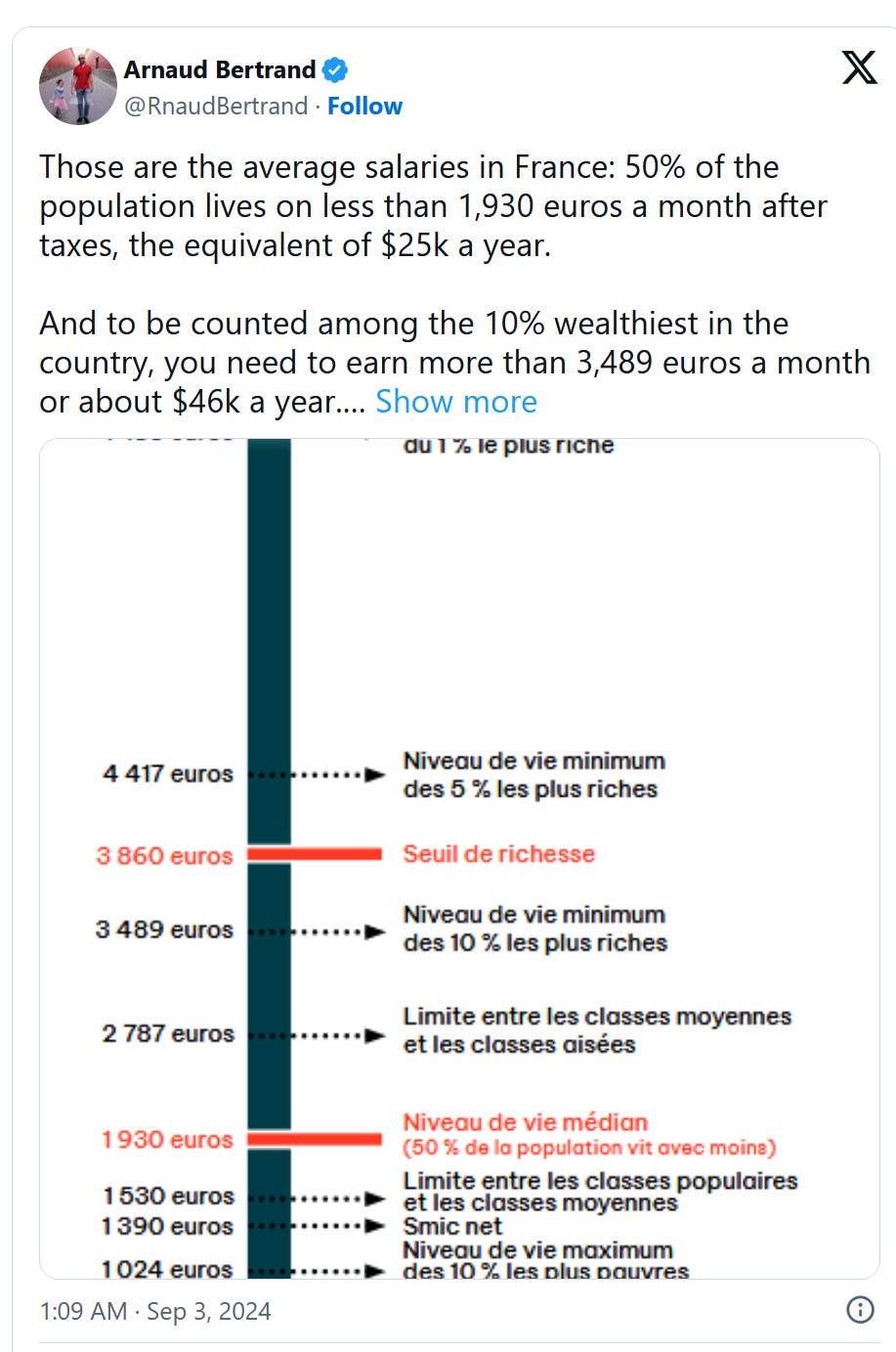
Macron accused of stealing 2024 elections from left-wing winners
These policies of tax breaks for the oligarchs and austerity for the working class earned Macron an approval rating of just 26% in June, on the eve of the 2024 elections.
Given the overwhelming popular opposition to the “president of the rich”, it was no surprise that he lost the vote.
In first place in the electoral contest was a left-wing coalition called the New Popular Front (Nouveau Front populaire in French). It won 180 seats in the 577-member National Assembly (31% of the total).
Macron’s center-right coalition Ensemble came in second, with 159 seats (nearly 28% of the total).
In third place was the far-right political party National Rally and its allies in the Union of the Far-Right, which together got 142 seats (close to 25% of the total).
The right-wing Republicans came in a distant fourth place, with a mere 39 seats (less than 7% of the total).
Despite the fact that the Republicans won just 6.6% of the vote in the first round and 5.4% in the second, Macron selected as prime minister a politician from this unpopular right-wing party, Michel Barnier, allowing him to form a government.
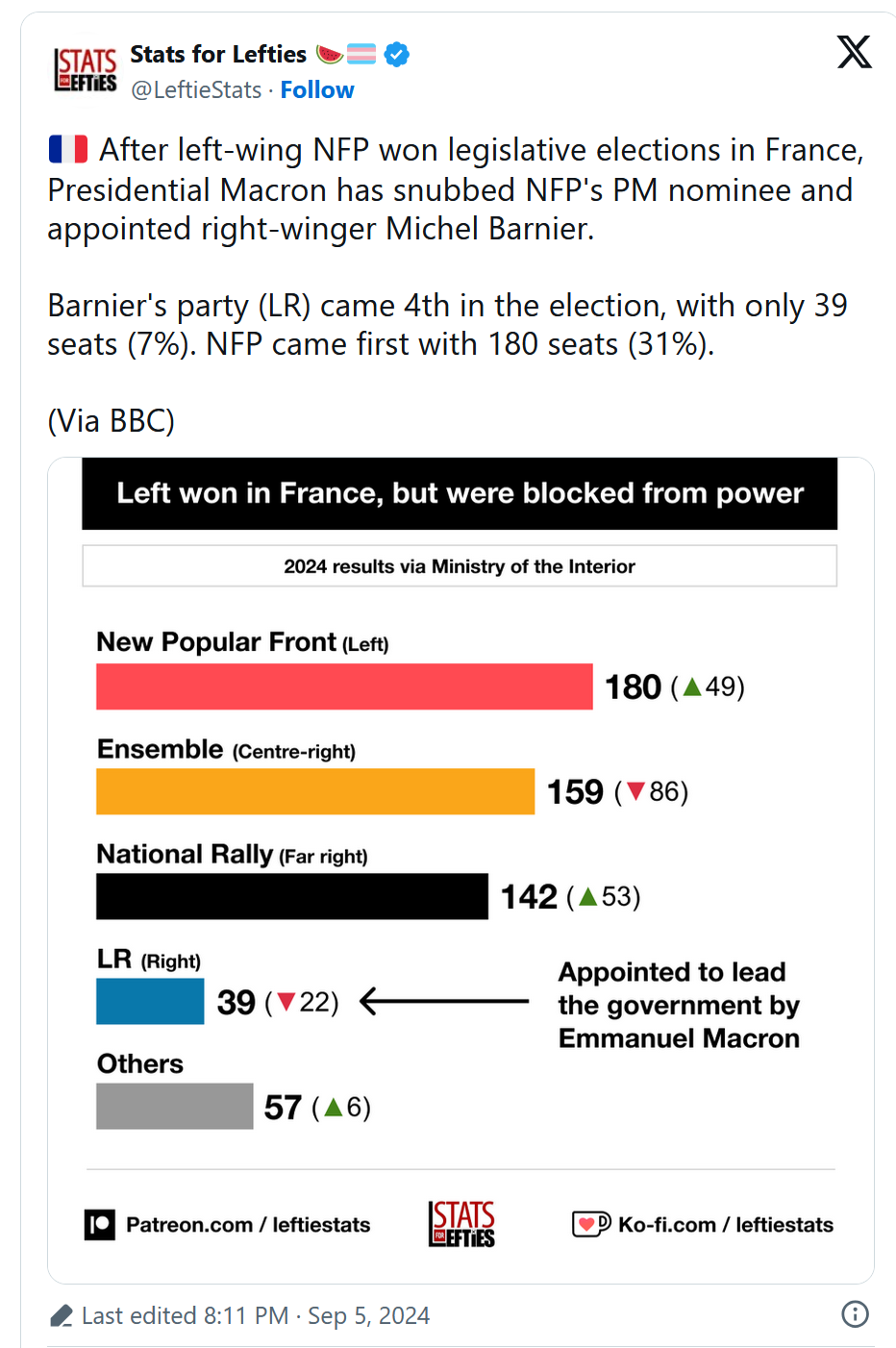
The de facto leader of the New Popular Front is the anti-war socialist Jean-Luc Mélenchon, the founder of the leftist party La France Insoumise (“France Unbowed”).
Mélenchon blasted the “president of the rich” for refusing to let the left-wing winners form a government.
“Emmanuel Macron officially denies the result of the legislative elections”, the leftist leader declared. “He has just appointed Michel Barnier. A member, among others, of a party that came last in the legislative election”.
“Emmanuel Macron stole the election from the French people”, Mélenchon said.
A lawmaker from La France Insoumise, Mathilde Panot, accused Macron of carrying out a “coup” and acting as an “autocrat”.
“52 days after the government was defeated at the polls, Macron continues to see himself as an autocrat”, Panot said. “By appointing Michel Barnier, the president refuses to respect popular sovereignty and the choice made at the ballot box”.
The New Popular Front called for protests against what they described as an attack on democracy.

By appointing the conservative Barnier as prime minister, Macron was implicitly relying on support from the far-right National Rally party, which came in third place in the election.
National Rally, previously known as the National Front, is led by far-right politician Marine Le Pen, the daughter of Jean-Marie Le Pen, a notorious fascist extremist and Holocaust denier. Jean-Marie Le Pen founded the National Front, although his daughter later expelled him and renamed the party, in an attempt to rebrand it and distance it from overt fascism.
Just a few days before naming Barnier prime minister, Macron held one-on-one talks with Le Pen. In their meeting, the center-right president and far-right leader apparently came to an agreement to form a new government led by the Republican Barnier.
France’s major newspaper Le Monde noted that the far right was given a “kingmaker role in Macron’s prime minister search”. Macron had repeatedly called up Le Pen and asked for her approval in selecting a new candidate.
As another media outlet put it, “Emmanuel Macron just gave the National Rally the keys to the truck”.
Prominent French analyst Arnaud Bertrand explained how Macron was able to keep the election winners out of power:
“I know many people are utterly confused as to how Macron could have nominated a Prime Minister whose party came 4th in the election with 5% of the vote, so let me explain it in the simplest possible way.”
Basically after the elections the president – Macron in this instance – is free to choose who he wishes as PM if he doesn’t like the results and if he gets assurances that Parliament won’t censure his choice. I’m serious, that’s how it works. And in this instance Macron seems to have made some sort of agreement with Le Pen to ensure there’d be no censure in parliament.
And technically a French president doesn’t actually even need to get assurances that Parliament won’t censure his choice of PM, he can just appoint anyone he likes. But that’d be fairly pointless because then his chosen PM would get censured.
But what’s the point of voting then if the president can just dismiss the results and appoint whoever he wants?
Exactly the question many French people are asking themselves right now…
Because even though all past presidents had this power to just dismiss the election results, this is actually the first time in the history of the French 5th Republic that a president chooses someone as PM who isn’t from the winning party.
Western leaders congratulate election-losing PM Barnier as symbol of “democracy”
In his first official remarks as prime minister, Michel Barnier delivered a condescending speech about what he called the “the people from below”.
Despite the fact that Barnier’s Republicans came in fourth place in the election and won just around 6% of the vote, leaders of Western governments congratulated him and portrayed the unpopular election loser as a symbol of “democracy”.
Neoliberal technocrat Christine Lagarde, who previously served as France’s economic minister and director of the IMF and is now president of the European Central Bank, praised Barnier, writing, “We’ve known each other for many years and I am confident that you will do an excellent job serving the people of France and Europe”.
The European Commission’s notoriously hawkish right-wing President Ursula von der Leyen proclaimed, “I know that Michel Barnier has the interests of Europe and France at heart, as his long experience demonstrates. I wish him every success in his new mission”.
Canada’s neoliberal centrist Prime Minister Justin Trudeau chimed in as well, stating, “Congratulations, Michel Barnier, on being named Prime Minister of France”.
Apparently oblivious to the irony, Trudeau added, “Canada and France share a history, a language, and the values of democracy and freedom. I know we’ll work closely together, to the benefit of both our nations”.
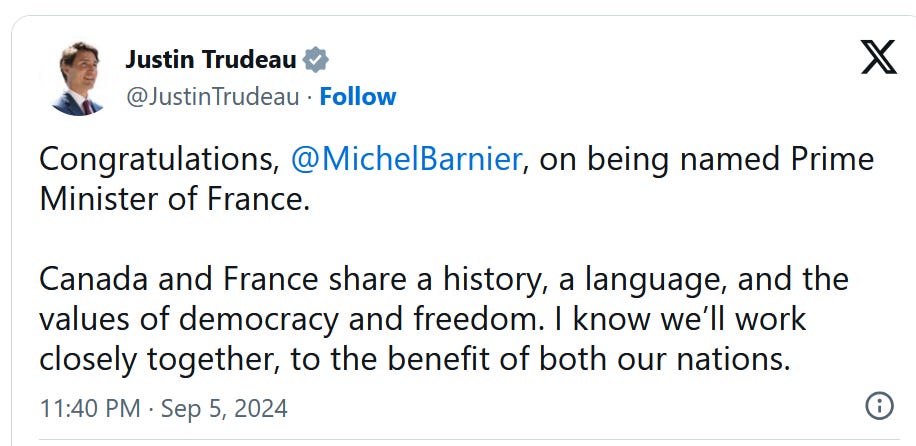
We remind our readers that publication of articles on our site does not mean that we agree with what is written. Our policy is to publish anything which we consider of interest, so as to assist our readers in forming their opinions. Sometimes we even publish articles with which we totally disagree, since we believe it is important for our readers to be informed on as wide a spectrum of views as possible.




